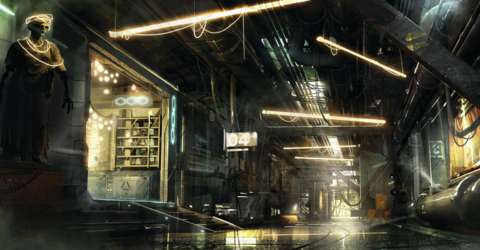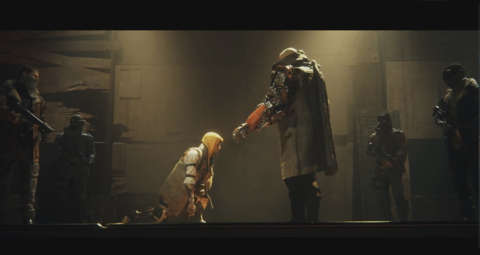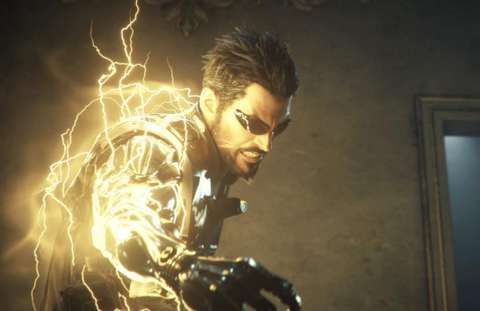Deus Ex: Human Revolution was about the world changing. Whether those changes were for the better or the worse was up to players; in the last moments of the game, protagonist Adam Jensen--a man made half-machine after a fatal encounter that should have killed him--was handed power over humanity's fate. Jensen's final choice, made by the player, could either warn humanity of augmentation's dangers moving forward or offer them a partial version of the truth. Alternatively, Jensen could place blame in such a way that augmentation and technological resource will flourish as humanity turns on its opponents in anger.
But there was one more ending. By doing nothing--choosing none of the above--Jensen would activate the self-destruction of Panchaea, the island home of the world's most ambitious geo-engineering projects. By destroying Panchaea and everyone on it at the time, Jensen makes a statement that it isn't up to one person or group to decide the world's fate; it's humanity's own choice to make.
It is this final choice that developer Eidos Montreal has chosen to use as the base for Deus Ex: Mankind Divided, the sequel to Human Revolution. But in making this one ending canon, some fans of the series say it ruins the poignancy of the choices they made in Human Revolution. But according to Deus Ex executive art director Jonathan Jacques-Belletete, the path chosen for Mankind Divided includes elements of all possible endings. In wrecking Panchaea, you do many things--expose the truth, but not all of it, and allow humanity a chance to decipher the meaning of these things for themselves.
Firearms Expert Reacts to Ghost Recon Breakpoint's Guns Xbox Studio Closures Are Confusing | Spot On Gray Zone Warfare | Community Briefing Trailer #1 Senua's Saga: Hellblade II - Senua's Psychosis Feature Trailer Squirrel With A Gun - Official Announcement Gameplay Trailer Night Slashers: Remake || Official Christopher Smith Character Gameplay Trailer Street Fighter 6 - 8 Minutes of Akuma Gameplay (High-Level CPU) Animal Well GameSpot Review Roblox - Netflix Nextworld Official Trailer Crow Country | Official Launch Trailer Halo Infinite - Official "This is Halo" Extended Multiplayer Trailer Master Detective Archives: RAIN CODE Plus - Official Announcement Trailer
Please enter your date of birth to view this video
By clicking 'enter', you agree to GameSpot's
Terms of Use and Privacy Policy
"We kind of went into that quite naturally, really, because we looked at what the Panchaea incident was and tried to evaluate how much of a shock wave it would've given the world, and how the world react to such a danger, or such an event," he explained. "Like what they say, it's like a shock treatment. That's what 9/11 was. That's what Pearl Harbor was. A global shock treatment. Its like people get literally in a state of shock, and that's when people make really rash decisions. That's when all sorts of control laws are installed, and that's usually when the state of the world changes quite a bit.
"We can analyze the Panchaea incident as being that, and it gave us leeway to have a very, very different state of affairs, a different state of the world while being in the exact same universe and explore different themes within that," he added. "That was definitely one of the reasons [we chose that ending] at a very high level. You have a little bit of all different endings in the canon ending we chose, because at the end of the day, you can still change the truth."
In moving from Human Revolution to Mankind Divided, the baroque influence on the series' art style has all but faded away. The artistic design hasn't changed much, Jacques-Belletete notes, but the clutter and congestion of Human Revolution has paved the way for how things look in this next game. This time around, however, players will be able to traverse more territory, working their way through huge vertical structures and rummaging through the flotsam and jetsam of a rapidly evolving world.

"Human Revolution was all about clutter and an orgy of details," Jacques-Belletete explained. "We made up like 100 brands, fake brands with the stickers everywhere and all that kind of stuff. It was pretty much unheard of at the time [in games]. With Mankind Divided, we have the true power now to do that vision that we had. Before it was the first stepping-stone to that vision, and now we can really achieve it. There's nothing new to it in terms of the high-level aesthetic goals and the amount of detail, but we looked at our sandbox and the tools that we had and now we're like, holy shit, we can really do what we've always wanted to do."
But what about all that black and gold? The colors are still present in Mankind Divided, but not as prominent. Some areas have taken on a bluish color wash, or have piled on shades of slate gray.
"The black and gold had to do with the baroque style, the transhumanist side of the debate," Jacques-Belletete said. "It was a whole cyber renaissance thing, the renaissance analogy to augmentations and transhumanism and all that stuff. Gold also represented the sun for the whole Icarus myth parallels. But now because the world has made a kind of 180 degree turn, augmentations are seen as something dangerous now. The world has moved to more of what we call corporate feudalism. That's the norm in the world and Mankind Divided. Corporations are taking over it.
"[Mankind Divided] is all based on the brutalism, the brutalist architecture movement, which has to do a lot with crude concrete, crude materials, harsh plain angles. It looks like fortifications. It's almost like we've gone back to the Dark Ages of the medieval era, before the Renaissance. Because of that, the palette is a lot more desaturated. There's a lot more blue. Whenever you have this kind of apartheid, or you have this kind of control over everybody, this is when you have the blues, this is when you have the desaturation, and this is when you have that gloominess. And when you go to the areas that are a bit more controlled by the augmented people, like in the ghetto, this is when the gold comes back, almost as if they're bringing their own little candles. It's all an analogy. It was really just with the story it made sense to have less of it."
Firearms Expert Reacts to Ghost Recon Breakpoint's Guns Xbox Studio Closures Are Confusing | Spot On Gray Zone Warfare | Community Briefing Trailer #1 Senua's Saga: Hellblade II - Senua's Psychosis Feature Trailer Squirrel With A Gun - Official Announcement Gameplay Trailer Night Slashers: Remake || Official Christopher Smith Character Gameplay Trailer Street Fighter 6 - 8 Minutes of Akuma Gameplay (High-Level CPU) Animal Well GameSpot Review Roblox - Netflix Nextworld Official Trailer Crow Country | Official Launch Trailer Halo Infinite - Official "This is Halo" Extended Multiplayer Trailer Master Detective Archives: RAIN CODE Plus - Official Announcement Trailer
Please enter your date of birth to view this video
By clicking 'enter', you agree to GameSpot's
Terms of Use and Privacy Policy
In terms of designing the people of the Deus Ex world, Jacques-Belletete said that games have in a way moved past the uncanny valley of last generation, thanks to the latest consoles and technology. Without the uncanny valley to lean on, however, designing augmentations for Mankind Divided is a little trickier. You want people to seem creepy and unnatural, he said, but the powerful technology available to developers helps them really render their humanity--literally. That's why this time around players will see more characters walking around with robotic arms, facial implants, the works. Although there is a line between cool and stupid, Jacques-Belletete noted.
"I had that arm that went like a jackhammer, that was a crossed line right there," he said. "Yet they did it in the Avengers, right? I remember when I saw that, I was like, it doesn't look that stupid. Anyway, comics and film are two different moods, ambiance, and tones. Deus Ex is a very serious game. It takes itself very seriously. The humor is almost only in sarcasm that Adam has. He has a bit of sarcasm, but he's very stoic. You have to consider all this.
"We talk with a lot of real biologists and people that [work with] biotechnologies and augmentations and stuff like that," he added. "Because we work so closely with these things, it helps us make sure that it's credible and that it doesn't cross a certain line. But we've got to keep in mind that it's a game as well, so we have things like the gun arms now. It's a little more out there than Human Revolution, but I think it's still within the boundaries of that flavor we're always trying to keep."
In conversations with colleagues and on forums, I've seen a lot of comparisons between Mankind Divided's story as seen in the trailers and the basic plot of some X-Men stories. When asked about these comparisons, Jacques-Belletete said both stories share the same core idea of segregation.

"People are afraid of people who are different than them. They're afraid," he said. "I guess the through line is that. It's all about segregation. When you're afraid of someone that's not like you, you have a tendency to push away, racism, discrimination, all that stuff. I think that's what they have in common and, yeah, people are totally right. We knew it right from the beginning, it was even part of our references when we started.
"I think it's really just duality between what being a human being is and what the limitations are, and is it okay to modify these limitations," he continued, focusing on Deus Ex's central ideas on human augmentation. "Should we do it or not? What is the meaning? What kind of questions and moral stuff does it bring to the table?"
But in the grand scheme of things, the big connection between players and the story of Deus Ex is Adam Jensen. There is, however, one big thing separating Jensen from the players who control him: his lack of full humanity. Jensen is less man than he is machine, and with Eidos describing him in Mankind Divided as "man 2.0" and the gameplay footage we've seen so far, it feels as though the bits that make him human are receding. In recent demos, we see Jensen arguing with another augmented man, trying to wheedle the truth from him and ultimately save him. Human Revolution saw him as a blank canvas in which players could impress their moral choices, but this time around, with so much changes to the world and his body and his status as a double agent between the game's two warring factions, players will struggle to make the best choices in the moment.

"I think Adam is really a vessel. The game is a vessel for that, but Adam even more so because we never wanted Adam to be pro- or anti- whatever, that at the end of the debate, the transhuman debate, he's just kind of there," Jacques-Belletete said. "I think that's what makes him stand apart from the other [heroes] is that as you play him and as you experience the world, it really makes you ponder about all this stuff.
"Eidos Montreal still receives tons of letters and emails from people that are like, 'Oh my God. I'm going to go study this. I'm going to study that. This is what I want to do with my life.' I've heard from people that are scared shitless. It's like, 'No, no, no. These things are not going to happen.' But it also seems very plausible that it can go into that direction."
Jensen's story has had a genuine positive impact on players, Jacques-Belletete said.
"Some people with disabilities write to us saying, 'It's given me a positive view on my situation and what things could do.' Some people with disabilities wrote us that they were finishing high school and want to study biology or biotechnology. Adam is, for me at least, one of the strongest characters, and it really makes you think about an issue and what it means to be either on one side or the other of that issue.
"It was like that in Human Revolution, and we're just continuing that with Mankind Divided," he added. "Now with Mankind Divided, it's this: what happens with people that are now either against that new thing or afraid of it? It's the same polarization but with a new kind of a stone thrown in the water."
Firearms Expert Reacts to Ghost Recon Breakpoint's Guns Xbox Studio Closures Are Confusing | Spot On Gray Zone Warfare | Community Briefing Trailer #1 Senua's Saga: Hellblade II - Senua's Psychosis Feature Trailer Squirrel With A Gun - Official Announcement Gameplay Trailer Night Slashers: Remake || Official Christopher Smith Character Gameplay Trailer Street Fighter 6 - 8 Minutes of Akuma Gameplay (High-Level CPU) Animal Well GameSpot Review Roblox - Netflix Nextworld Official Trailer Crow Country | Official Launch Trailer Halo Infinite - Official "This is Halo" Extended Multiplayer Trailer Master Detective Archives: RAIN CODE Plus - Official Announcement Trailer
Please enter your date of birth to view this video
By clicking 'enter', you agree to GameSpot's
Terms of Use and Privacy Policy

